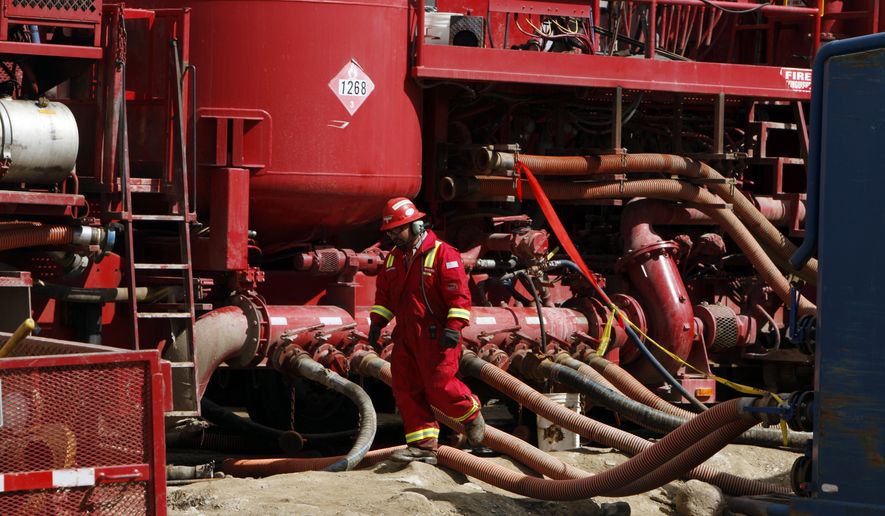OPINION:
Events in the United States occurring during the past two weeks promise to shake up global energy markets and undermine Russian power, unless President Obama or Democratic presidential candidate Hillary Clinton further attempt to prop up Russian President Vladimir Putin’s energy cabal.
On Sept. 27, U.S.-produced liquefied natural gas (LNG) exports — used in chemical production, heating and power generation — arrived in Scotland, marking the first time fracking-derived natural gas developed from shale fields in the United States was sent to northwestern Europe.
Over the past decade, fracking has sparked an unprecedented energy revolution in the United States. Increased domestic energy production related to fracking lowered electricity and gasoline prices, creating hundreds of thousands of high-paying jobs and helping to rebuild the U.S. role as a global leader in chemical manufacturing. Fracking also moved the country closer to attaining true energy independence than it has been for decades.
Despite research showing fracking does not harm the environment and reduces greenhouse-gas emissions, natural gas exploration is off to a slow start in Europe, where protests by radical environmentalists have thus far halted nearly all significant attempts at fracking.
The New York Times reported in 2014 some protests against fracking in Europe were largely financed by the state-owned Russian energy giant Gazprom. In 2014, NATO’s then-Secretary General Anders Fogh Rasmussen, said, “Russia, as part of their sophisticated information and disinformation operations, engaged actively with so-called nongovernmental organizations — environmental organizations working against shale gas — to maintain dependence on imported Russian gas.”
Recently leaked speeches by Mrs. Clinton given behind closed doors at a series of private meetings in Edmonton, Alberta in 2014 show she acknowledged Russia has financed anti-fracking, anti-oil-pipeline protesters in the United States. According to one speech released by WikiLeaks, Mrs. Clinton said, “We were even up against phony environmental groups funded by the Russians to stand against” fracking and the Keystone XL oil pipeline.
As described in her leaked emails, this confession was presumably part of Mrs. Clinton’s “private position,” since she never denounced the Russian-funded anti-fracking protests publicly, despite the fact the National Review, among other publications, exposed Russia’s covert funding of U.S. anti-fracking environmental groups through Bermudan intermediaries in 2015.
Russia is right to fear the fracking revolution, the construction of LNG export terminals in the United States, and LNG import terminals around the world, especially in Europe. Russia is the European Union’s main supplier of oil and virtually dominates the region’s natural gas energy market. Russia has used its power as Europe’s energy broker to extort concessions — or at least quiescence — from EU member states, notably while conducting its various controversial activities in Georgia, Ukraine and Chechnya.
U.S. LNG exports threaten to break Russia’s energy stranglehold on Europe, undermining its political influence. Bulgaria, Germany and Poland have all expressed interest in receiving U.S. LNG shipments to loosen Gazprom’s control of their energy markets. Deutsche Bank estimates the United States could become Europe’s biggest natural gas supplier within a decade.
Trevor Sikorski of the London-based consulting firm Energy Aspects told The Wall Street Journal Russia could cut its natural gas prices well below the U.S. price. However, he says doing so would harm Russia’s struggling economy, which is heavily dependent on exports of oil and gas to pay for food and other consumer goods it imports.
Russia’s actions to suppress fracking across the European Union, while bad for Europe, could be a boon for the United States, opening up new markets for U.S. natural gas suppliers, creating jobs and improving the trade balance. If EU member states won’t develop their own natural gas and oil supplies, U.S. companies, workers and investors will be happy to profit by providing oil and gas to them.
The United States’ first LNG export shipment went to Brazil from Cheniere Energy’s Sabine Pass LNG export facility in late February. Since then, Cheniere’s Sabine Pass terminal has made multiple shipments to Latin America, the Middle East, India and to other European nations such as Lithuania, and countries in the Iberian Peninsula.
While the future looks bright for the United States, it could be prospering even more if not for roadblocks the Obama administration has thrown up against oil and gas production on public lands and its denial of permits to build new natural gas export terminals — all of which are policies Mrs. Clinton has promised to continue or expand upon if she becomes president.
If Russia, one of the United States’ prime economic and geopolitical opponents, is against America developing its oil and gas resources, shouldn’t U.S. leaders be for it?
• H. Sterling Burnett (hburnett@heartland.org) is a research fellow on energy and the environment at the Heartland Institute.




Please read our comment policy before commenting.